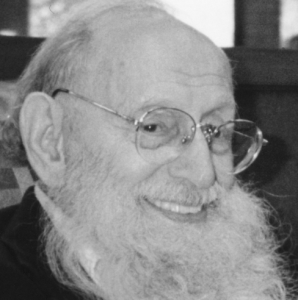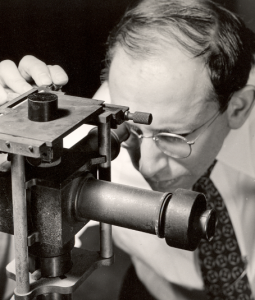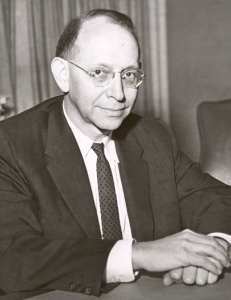
A chemical engineer from Pennsylvania, who invested well, never married and died last year at age 97, shocked The Pittsburgh Foundation by suddenly dropping a $50 million endowment in their lap-- the largest gift in 65 years, personally aimed to transform Pennsylvania into a scientific research powerhouse.
"Charles Kaufman hoped that his fund could help...Pennsylvania win a Nobel Prize," Wendy Denton Heleen, executrix of his estate, explained to the Pittsburgh Tribune-Review."He told me ...with a tear in his eye that this would be his greatest legacy." But his other legacy-- judged by an aesthetic, moral accounting-- is the gradually deepening pattern of a life, well-lived.
His dramatic final gesture epitomizes a life that began almost a century ago in Clarion, Pennsylvania. By the time Kaufman graduated from high school, he was already an avid hunter and fisherman, beginning a life-long passion for nature. And like so many of his generation, after he left home in 1931 to earn a bachelor's degree in chemical engineering in 1936, the Depression became a searing, permanent memory. Although friends said Kaufman was always an optimist, he lived modestly for the rest of his life. His constant advice: "Have no debt. If you're already in debt-- work hard until you get out."
He was named director of lab research in 1950

After college Kaufman moved near Pittsburgh to work for the Hagan Corporation, which was soon acquired by Calgon, a water treatment company, and then obtained a master's degree from Carnegie Mellon in 1942. Earning a reputation for thorough and realistic lab analysis--letting the results speak for themselves--he was named the Director of Laboratory Research in 1950. Then in 1955 Kaufman was promoted to Manager of Chemical Product Development, where he displayed a flair for long-term strategic planning.
Later in 1967, while Kaufman was Director of Purchasing, he worked with Bob Newcomer, who recently spoke about his friend, "He had an engineering mind and used it to look into the future in all aspects of his life."A voracious reader, he began every day reading the Wall Street Journal, followed by regional newspapers, and finishing with chemical industry and natural resource specialty magazines about timber, oil, water and gas. Newcomer added, "Kaufman knew everything about natural resources, both above and below ground." In an era before huge databases and real-time data-mining, every successful corporation had at least one Charles Kaufman.
He confidently amassed a fortune in land, water, and timber
Eventually his uncanny ability to marry scientific facts with economic and cultural trends made this "quiet, unassuming" man an ironic arbiter of corporate career success. Infighters a step or two above him on the corporate ladder, fighting over new products and marketing strategies, ignored his knowledge of the facts at their peril.

Several years after Calgon had been acquired by Merck, Kaufman retired in 1971. He could now devote himself to investing, and without the help of financial advisors, confidently amassed a fortune in land, water, and timber.
By the 70's, having already glimpsed many of the emerging forces that would shape today's American landscape, Kaufman became an early and active member of the Western Pennsylvania Conservancy, an environmental organization. His youthful passion gradually deepened by a growing concern about the effects of over-development.
At 92, Kaufman learned how to use a computer
Kaufman's philanthropy started in 1984, when he and his sister, Virginia, who died in 2008, established a fund at the Pittsburgh Foundation with an initial $100,000 to support land conservation, public education, and Jewish health care. "He was extraordinary," said Ms. Heleen. "He was probably the smartest person I've ever met. He was still preparing his own complicated income tax and gift tax returns into his 90s."
In 2005 at the age of 92, Kaufman learned how to use a computer. Surfing the Internet, seriously contemplating his legacy, he discovered the Welch Foundation of Texas, which was started in 1954 by Robert Welch, a Texas oilman who had left $25 million to support chemistry research in Texas.
By the time Kaufman found the Texas Foundation, Welch's gift had ballooned into $660 million in grants, partly supporting research by two Nobel laureates, and helping to make Texas a leader in chemical research. Wendy Heleen touched on his motives, "He called ... and said: 'I want to do something similar to this for educational institutions in the state of Pennsylvania.'"
In 2006, he began a small award for substantial contributions to science
In 2006, without disclosing the true size of his fortune, Kaufman gave The Pittsburgh Foundation an additional $1.5 million to start a yearly Charles E. Kaufman Award "for substantial contributions to science for both the betterment and understanding of human life."
Pioneering research in green chemistry earned Terry Collins, Professor of Chemistry at Carnegie Mellon University, the first $50,000 award in 2008. "This is my way to give back and to help promote a better and a fairer world," Kaufman said at the time. "I can accomplish more through others than I ever did myself, and the work in which Prof. Collins is involved is really important."
After his death, Charles E. Kaufman finally endowed his Charles E. Kaufman Fund at The Pittsburgh Foundation with the final $50 million and stipulated that $35 million to $40 million of his gift sponsor research in chemistry, biology, and physics through endowed chairs, fellowships and awards exclusively in Pennsylvania.The gift is expected to generate about $2 million a year for scientific research, and will take about a year before it is up and running.
The remaining $10 million to $15 million will support Kaufman's interests in such areas as conservation, Jewish causes, and public education.
Bob Newcomer tried to sum up the long arc of his friend's life,"Charles, quiet and unassuming, was disciplined and fair in making decisions for business and personal relationships. He lived long enough to see many of his predictions come true." Kaufman's life seems to have had a long enduring pattern, combined with the ability to look realistically, profoundly into the future: If he's already imagined a future Nobel Prize for Pennsylvania researchers-- it's probably just two or three decades away. So like Charles Kaufman, take the optimistic, long view. You'll probably live longer.
Click here to understand the Foundation's reaction.
Click here to read the Ralph Schugar Chapel obituary for more family information.
How have you given back to your community?
Photos: Charles Kaufman-- Bob Newcomer and Wendy Denton Heleen, executrix of his estate


